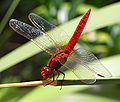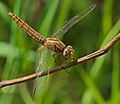Crocothemis
Appearance
| Crocothemis | |
|---|---|

| |
| Crocothemis servilia male | |
| Scientific classification | |
| Domain: | Eukaryota |
| Kingdom: | Animalia |
| Phylum: | Arthropoda |
| Class: | Insecta |
| Order: | Odonata |
| Infraorder: | Anisoptera |
| Family: | Libellulidae |
| Subfamily: | Sympetrinae |
| Genus: | Crocothemis Brauer, 1868[1] |
Crocothemis is a genus of dragonflies in the Libellulidae family,[2] subfamily Sympetrinae (darters). Various species of this genus occur in southern Europe, Africa, Asia, Australia and the Southwest Pacific. They are generally small to medium-sized dragonflies.
These dragonflies are often noticed due to their colours. Males are generally very brightly coloured, ranging from totally red in several species, to the rich blue of Australia's C. nigrifrons. As with many Libellulid species, the females tend to be dull brown or orange.
Like most libellulids they tend to perch on sticks, reeds or stones near water, flying out to catch insects then returning to their perch.
Species
[edit]The genus contains the following species:[3]
| Male | Female | Scientific name | Common Name | Distribution |
|---|---|---|---|---|
| Crocothemis brevistigma Pinhey, 1961 | Spotted Scarlet | Ikelenge, Mwinilunga, Zambia | ||
| Crocothemis chaldaeorum Morton, 1920 | Bahrain; Iran; Iraq; Qatar; Saudi Arabia; Kuwait | |||
| Crocothemis corocea Navás, 1918 | ||||
 |
Crocothemis divisa Karsch, 1898 | divisa scarlet, slender scarlet, slender scarlet-darter[4] | tropical Sub-Saharan Africa, Madagascar | |
 |
 |
Crocothemis erythraea (Brullé, 1832) | scarlet darter,[5] broad scarlet[6] | southern Europe and throughout Africa, western Asia as far as southern China |
 |
 |
Crocothemis nigrifrons (Kirby, 1894) | black-headed skimmer[7] | Australia, Papua New Guinea, and the Solomon Islands. |
 |
Crocothemis sanguinolenta (Burmeister, 1839) | little scarlet, slim scarlet-darter, small scarlet[8] | Africa south of the Sahara (including Madagascar), in the Levant, and in the south of the Arabian Peninsula. | |
| Crocothemis saxicolor Ris, 1921 | granite scarlet[9] | Malawi, Mozambique, Zambia, Zimbabwe, possibly Liberia, and possibly Sierra Leone. | ||
 |
 |
Crocothemis servilia (Drury, 1773) | scarlet skimmer,[10] oriental scarlet[11] | east and southeast Asia |
| Crocothemis striata Lohmann, 1981 | Black-legged Scarlet | Madagascar |
References
[edit]- ^ Brauer, Friedrich (1868). "Verzeichniss der bis jetzt bekannten Neuropteren im Sinne Linné's. Erster Abschnitt". Verhandlungen der Zoologisch-Botanischen Gesellschaft in Wien (in German). 18: 359–416 [367] – via Biodiversity Heritage Library.
- ^ "Genus Crocothemis Brauer, 1868". Australian Faunal Directory. Australian Biological Resources Study. 2012. Retrieved 27 February 2017.
- ^ Martin Schorr; Martin Lindeboom; Dennis Paulson. "World Odonata List". University of Puget Sound. Archived from the original on 28 August 2010. Retrieved 11 Oct 2010.
- ^ Clausnitzer, V.; Suhling, F.; Dijkstra, K.-D.B. (2016). "Crocothemis divisa". IUCN Red List of Threatened Species. 2016: e.T59858A84817145. doi:10.2305/IUCN.UK.2016-3.RLTS.T59858A84817145.en. Retrieved 12 November 2021.
- ^ "Checklist of UK Species". British Dragonfly Society. Retrieved 28 May 2011.
- ^ "Checklist, English common names". DragonflyPix.com. Archived from the original on 4 December 2012. Retrieved 5 August 2010.
- ^ Günther Theischinger; John Hawking (2006). The complete field guide to dragonflies of Australia. CSIRO Publishing. ISBN 0-643-09073-8.
- ^ Boudot, J.-P.; Clausnitzer, V.; Schneider, W.; Suhling, F.; Dijkstra, K.-D.B.; Samraoui, B. (2016). "Crocothemis sanguinolenta". IUCN Red List of Threatened Species. 2016: e.T59860A84816724. doi:10.2305/IUCN.UK.2016-3.RLTS.T59860A84816724.en. Retrieved 12 November 2021.
- ^ Clausnitzer, V.; Suhling, F.; Dijkstra, K.-D.B. (2010). "Crocothemis saxicolor". IUCN Red List of Threatened Species. 2010: e.T59861A12104120. doi:10.2305/IUCN.UK.2010-3.RLTS.T59861A12104120.en. Retrieved 12 November 2021.
- ^ Dunkle, Sidney W. (2000). Dragonflies through binoculars. OUP USA. ISBN 0-19-511268-7.
- ^ Dow, R.A. (2017). "Crocothemis servilia". IUCN Red List of Threatened Species. 2017: e.T163607A80679957. doi:10.2305/IUCN.UK.2017-3.RLTS.T163607A80679957.en. Retrieved 12 November 2021.
External links
[edit] Media related to Crocothemis at Wikimedia Commons
Media related to Crocothemis at Wikimedia Commons Data related to Crocothemis at Wikispecies
Data related to Crocothemis at Wikispecies
